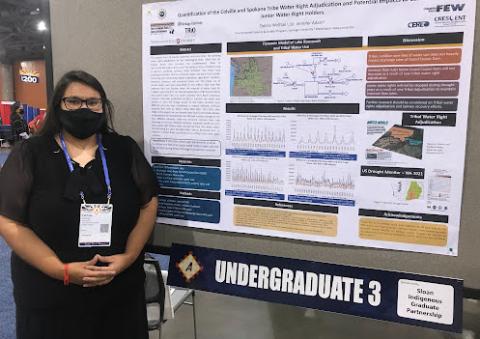Heritage University (HU) has been a GCSE member for over 10 years and is located on the ancestral homelands of the Yakama Nation in Washington State. As one of two universities in the United States that is both a Hispanic Serving Institution (HSI) and a Native American Serving Nontribal Institution (NASNTI), HU is committed to providing opportunities for underrepresented students to participate in STEM research, internships, and hands on programs at the intersection of environmental and social issues.

The Heritage University Chapter of GCSE EnvironMentors is housed in the Center for Indigenous Health, Culture & the Environment (CIHCE). High school students from the Yakama Nation Tribal School conduct research on topics that include community air quality and natural resource management in forestry, wildlife and fisheries. The high school students are assigned HU undergraduate Environmental Science majors in the role of near-peer mentors. They are also paired with HU STEM staff, faculty and community mentors from the Yakama Nation and Ecotrust. While the COVID-19 pandemic initially presented challenges, the HU EM chapter was able to successfully pivot to distance education, utilizing trail cameras and Zoom. Dedicated partners from Yakama Forest Products uploaded videos of animals captured by the trail cameras and students were able to develop hypotheses, analyze the data, and complete research posters. This program was featured in Northwest Public Broadcasting in 2020.
HU also provides their Environmental Science & Studies students with international study abroad experiences in Panama and Costa Rica, with the goal of building global partnerships to empower indigenous peoples and promote sustainable culturally vibrant communities. The CIHCE runs the Panama-Heritage University Indigenous Intercambio Program (PIIP), a science and cultural exchange that emphasizes mutual learning and interconnectedness between Indigenous communities around the world. Native American and Latinx STEM students from Heritage University collaborate with Indigenous community members from the Ngäbe and Buglé Indigenous peoples of Panama on scientific research and community development projects. The CIHCE devotes significant effort to fundraising to ensure that all costs are covered for student participants, including stipends, thereby lessening the financial barrier that often prevents LatinX and Native American students from engaging in international study abroad.
Did you know?
The Heritage University People of the Big River Field Class connects students with tribal elders, scientists, and natural resource managers across the PNW region for a unique study that blends Western science with traditional ecosystem knowledge.